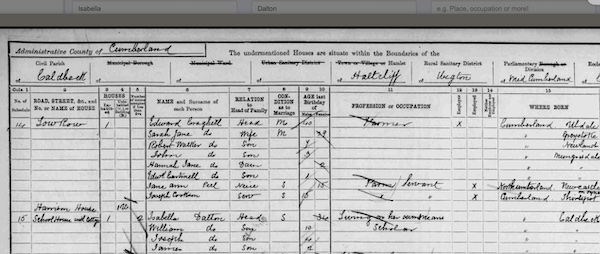My post on Wilson Towers includes the information that for 14 weeks in 1904, he employed a housekeeper called Isabella Dalton – who then went back to live in Wigton Workhouse.
Her story is unusual, too.
‘Of local character’
When NSPCC inspector Percy Cooke, visited Wilson Towers’ squalid cottage, on October 5, he found ‘a woman of local character’ in the house.
This seems to have been a woman Towers had brought back from Carlisle for a few days. She is later referred to as ‘a woman of loose character’.
But my first thought was that it was a reference to Isabella Dalton.
For Isabella had three illegitimate children. To borrow and adapt from Wilde: to have one illegitimate child seems like carlessness, to have three seems like total disregard of societal norms!
A family tradition
What is also surprising is that Isabella herself was illegitimate. And her mother Grace, who never married, had at least one other daughter.
Rewind
On Valentine’s Day 1821, farmer Edward Dalton married Jane Richardson. They were to have at least six children, starting with Grace (1822) and ending with Mary some 23 years later.
The census returns show them living at Low Row, Haltcliff. With them always is Mary Richardson, described as Edward Dalton’s niece. She was born about 1820 and on one census is noted as being deaf.
Grace’s children
The 1861 census, after ‘Mary, 15, daughter’ has ‘Ann 13, grand-daughter’ and ‘Isabella, 4, grand-daughter’. These were Grace’s illegitimate daughters. They weren’t to be the last.
Edward Dalton died in 1863. Probate went to his wife Jane and to Stodart Sewell of Ivegill –the husband of daughter Elizabeth Dalton. The will leaves everything to Jane:
‘And after her decease, to be equally divided among her surviving daughters, share and share alike.’
It’s curious that he says ‘her daughters’. The usual form is ‘my daughters’. He does say ‘my son-in-law’ when naming him as an executor.
His personal effects were under £450.
1871 shows Jane as an annuitant. With her is her daughter Grace, Isabella 14, Jane 7 and Edward 7 (and Mary Richardson). The enumerator got confused, as he listed Isabella and young Jane as being Jane’s daughters. Given Jane was now 74..!
So Grace’s children were:
- Ann Dalton born1847, no maiden name for mother.
- Isabella born 1856, ditto
- Jane born 1863 – and Edward 1863, same quarter, no maiden name for mother.
And the next generation…
In 1881, Isabella Dalton is 24 and a farm servant; son William is 6 months. They are at Harrison House with:
Grace Dalton, 59, annuitant, unmarried
Isabella is listed as Grace’s daughter. She has a sister Annie, 33, farm servant.
At School House above is Jane Dalton, widow, 83, annuitant. and Jane Dalton, 17, domestic servant.
Jane Dalton died in 1884, with administration of her affairs granted to her married daughter Elizabeth Sewell, of Millhouse, Castle Sowerby. It looks like Grace Dalton died two years later.
1891 Caldbeck
Harrison House School House, with cottage
Isabella Dalton 34, single, born Caldbeck, living on her own means
Children William 10, Joseph 4, and James 2 are all born Caldbeck.
Isabella Dalton in trouble
Isabella Dalton, of Haltcliff, Caldbeck, was summonsed by William Coulthard, attendance officer of Caldbeck School Board.
Wigton Advertiser. 27/2/1892
She was charged with neglecting to sufficiently educate her children William and Joseph Dalton. The bench made an attendance order and said if she was brought there again, she would be fined.
She doesn’t seem to have learned, for in September 1893, the Wigton justices fined her five shillings, including costs, for the same offence.
The workhouse
By 1901, Isabella Dalton, 48, born Haltcliff, was in Wigton Union Workhouse, listed as able-bodied.
Her son James, aged 12, was in Wigton Union Workhouse as well, also listed as able-bodied.
(There’s a James, 23, in the workhouse in Carlisle in 1911, but says born Carlisle, so can’t be sure.)
Joseph was luckier. In 1901, he was a farm servant at Drumburgh Farm. And possibly still a farm servant in 1911 (says b Wigton, so can’t be sure).
William was a farm servant at Hutton Roof in 1911. Can’t be sure about 1901, but again, he was old enought to be working then.
Isabella got a job in 1904 – much good that it did her. For that is when she went to be housekeeper to Wilson Towers.
In 1911, Isabella was in the workhouse. And so was Wilson Towers. Men and women were generally segregated, so hopefully she was able to avoid him.


One thought on “Isabella Dalton – an unusual life”
Comments are closed.